by Naomi L. | October 6, 2017 | J.C. Wolfe's Writing, Poetry |
Writing is my life, my love, my greatest passion.
Writing is who I am.
Writing is who I was always meant to be.
Books were my first gateway to this world, the magical world of fiction.
I read them every day as a child, devoured their words like chocolate.
Every day, they welcomed me with open pages and promises of wonderful and imaginative stories.
And they never disappointed me.
I knew I wanted to join them, those great authors who had invited me into their minds, into their homes, into their worlds.
I aspired to share in their magic.
And I knew from that young age that I had found the only path on which I would always belong.
I had taken my first step on the greatest journey of my life.
I penned short stories as frequently as ideas came to me.
I started several books (though I never finished most).
I scribbled words anywhere and everywhere I felt the spark of creativity.
My magical world was open and growing every day.
Fiction was my whole world, but there came a time when my own writing fell behind.
I stopped creating so many stories.
Before I knew it, the ideas stopped flowing.
And my magical world grew dark.
For years, I felt lost without my words.
My stories hid in the corners of my mind, never to come to light.
I only ever wrote for school anymore, a tedious task with none of the magic I had once known.
And then, one day, the spark came back.
An idea peeked out of the darkness and whispered for me to create again.
So I typed a few words into my laptop.
Those words became a sentence.
That sentence became a paragraph.
That paragraph became pages.
And those pages became the beginning of a story.
At last, my passion had returned.
Once forgotten in the darkness, my dream reemerged in my heart.
I began to pursue my passion again, to reach for that star I had longed for as a child.
This time, I dared to share my stories with the world.
Readers gave positive feedback and encouraged me to keep going.
My stories even brought me real-life love.
As my courage grew, so did my creative skills.
And then the time came to seriously start chasing my dream.
Starting a blog is one of the scariest yet greatest things I’ve ever done.
It opened my creativity to a whole new world.
I’ve met other writers, made new friends, and shared my stories with likeminded creatives.
Never have I felt closer to that star.
Now I’ve taken one more step forward on my writing journey.
A hundred thousand words have freed themselves from my mind, growing from my imagination into my first major work of art.
My first novel, the fantasy story I’ve long wanted to tell.
And as I shape these words into order, I feel more excited than ever.
No longer will I be just a writer; I will be an author.
I reflect on all the joys writing has given me—freedom, creativity, courage, magic—and I know I wouldn’t change a thing.
From my childhood days of devouring books to my adult years of creating stories and poetry, writing has given me everything I could ever want or need.
Writing has made me the person I’ve always hoped to be.
And though I still have much to learn, I’m always ready to take the next step.
For the love of writing, I know I can never stop creating.
I will never stop being who I am, who I was always meant to be.
I am a writer!
by Naomi L. | October 4, 2017 | Blog, Creative Writing |
It’s the first week of October, so regular readers of mine, you know the drill: it’s time to dive once again into my all-time favorite story, Romeo & Juliet! In the past, I’ve covered five points in the story that are often missed, the reasons it really is a great love story, a review of the book with both the play and the musical adaptation, and five lessons about love that can be learned from this story. Now I’m ready to cover even more of this timeless classic!
This year, I decided to dig a little deeper into the story and dedicate my annual R&J post to the literary devices that uphold it. So on that note, here are five major themes and motifs in Shakespeare’s Romeo & Juliet. Enjoy!
1) The Power of Love
But my true love is grown to such excess / I cannot sum up sum of half my wealth. – Juliet Capulet (2.6.33–34)
This one is kind of a given, but it’s such a prominent theme in Romeo & Juliet that it forever warrants a place at the top of the list. Though debates reign about the extent of the roles of fate, hatred, and violence in the play, it’s obvious that love is by far the most powerful force in this story. It brings the young lovers together, motivates them to risk everything to be together, and drives them to their tragic end. So let’s explore how powerful love really is in Romeo & Juliet, shall we?
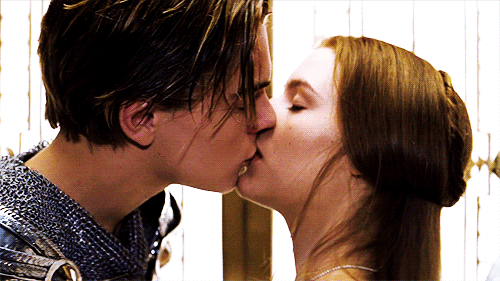
“Then have my lips the sin that they have took.” (1.5.110)
Romeo and Juliet share their first kiss (Romeo + Juliet, 1996)
To start, it’s important to define the type of love that dominates the play. There’s no question that the love in Romeo & Juliet is romantic, but what often gets overlooked is the fact that it’s also amoral. While other poets before him romanticized love as a beautiful and pure emotion, Shakespeare was more interested in portraying it as an intense and violent force that drives people into chaos and overpowers all other priorities, including life itself.
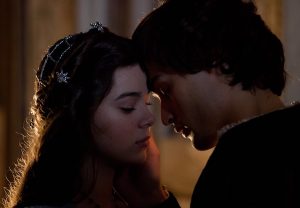
“You kiss by th’ book.” (1.5.112)
Romeo and Juliet find a moment of privacy at the Capulet Ball (Romeo & Juliet, 2013)
The greatest evidence of love’s intensity in Romeo & Juliet is the wide variety of descriptions and metaphors it receives throughout the play. In the sonnet that makes up Romeo and Juliet’s first conversation, love is described in religious terms, while in the prologue of Act II, the feeling is equated to magic. Its dangers are also mentioned by other characters: Friar Laurence warns Romeo about the fickleness of young love, while Mercutio’s Queen Mab speech outright criticizes the delusions of lovers’ dreams. Juliet even loves Romeo so much that she hardly has enough words to express her feelings all at once. Every character in the play seems to have an opinion on love, yet not one of them manages to describe it completely. It seems love, at least according to Shakespeare, is so powerful that it can’t be contained in any one definition.
Though the love in Romeo & Juliet is romantic, it’s far from idealized. Unlike the cheesy version in the bad poetry Romeo recites about Rosaline, Shakespeare’s depiction of love is a far more passionate and chaotic emotion that can evoke an astonishing amount of beauty and tragedy in a short period of time. No wonder this story is still so popular today; every time I read it, there’s something new to learn about love!
2) The Inevitability of Fate
A greater power than we can contradict / Hath thwarted our intents. – Friar Laurence (5.3.153–54)
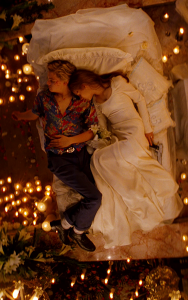
The star-crossed lovers meet their untimely end (Romeo + Juliet, 1996)
If love is the strongest theme in Romeo & Juliet, fate is a close second. From the opening lines of the chorus, it’s made clear to the audience that the young lovers are pretty much doomed from the start. While there is a solid argument that society is really to blame for Romeo and Juliet’s deaths, the fact that Shakespeare peppered his play with references to fate, fortune, and the stars hints at the idea that every circumstance leading up to the main characters’ tragic end was always out of their control.
Notably, the role of fate in this story isn’t just clear to the audience; it’s also evident to the characters themselves. Through the second half of the play, after Mercutio and Tybalt are killed, death always seems to linger in the corner of the lovers’ minds. They’re both haunted by omens—such as each other’s pale faces after spending the night together or Juliet’s vision of Tybalt’s ghost before taking the sleeping potion—and though they try to stave off the looming threat of tragedy, it soon becomes clear that their story can only end in their untimely deaths.
The inevitability of fate is emphasized by the many forms it takes throughout the play:
- The feud between the Capulets and Montagues, which is purposely never explained
- References to fate by the characters – “O, I am fortune’s fool!” (3.1.141), “Then I defy you, stars.” (5.1.24)
- Friar Laurence’s letter failing to reach Romeo
- Romeo dying just before Juliet wakes up
While fate often seems like an external and impersonal divine force driving the characters’ lives, it also manifests as the direct forces influencing Romeo and Juliet’s choices. The rivalry between the noble households culminates in the double murder that complicates the lovers’ marriage, and Capulet’s decision to change the day of the wedding contributes to the rush of events that leads to the final tragedy. Even the protagonists themselves play directly into the hands of fate. The irony of Romeo’s decision to die alongside Juliet is that by trying to defy fate, he inadvertently brings it about: Juliet kills herself as soon as she finds him dead, thus completing the tragic sequence of events set in motion from the play’s very first scene.
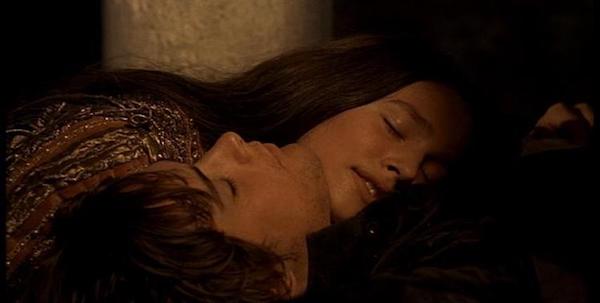
Juliet stabs herself with Romeo’s dagger and dies by his side (Romeo and Juliet, 1968)
Much like love, fate in Romeo & Juliet is an amoral and overpowering force that none of the characters can resist. Despite all their efforts to love each other in peace, Romeo and Juliet can never escape their tragic destiny as the “pair of star-crossed lovers” who “take their life”, immortalizing them as the ill-fated couple of one of the greatest love stories ever told.
3) The Duality of Passion (Love and Violence)
If the entire story of Romeo & Juliet could be summed up in one word, that word would be passion. Almost every scene in the play involves characters succumbing to powerful emotions that drive their actions and, consequently, the plot. Observe:
-
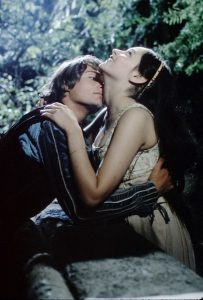
“My bounty is as boundless as the sea, / My love as deep; the more I give to thee, / The more I have, for both are infinite.” (2.2.133–35)
Act I: Montague and Capulet servants fight each other in the street (establishing the long-standing feud), Romeo agrees to attend the Capulet ball for the chance to see a girl he thinks he loves, Romeo and Juliet meet and fall in love at first sight
- Act II: Romeo risks death by trespassing into the Capulet orchard to see Juliet again, Romeo and Juliet declare their love for each other, Romeo proposes to Juliet the next day (via the Nurse), Romeo and Juliet get married
- Act III: Tybalt challenges Romeo to a duel for crashing the Capulet ball, Mercutio fights Tybalt to defend Romeo’s honor, Tybalt kills Mercutio, Romeo fights and kills Tybalt to avenge Mercutio, Romeo almost kills himself out of guilt, Romeo spends the night with Juliet, Capulet threatens to disown Juliet if she doesn’t marry Paris in two days
- Act IV: Juliet threatens to kill herself if Friar Laurence can’t help her get out of marrying Paris, Capulet gets so excited about Juliet becoming obedient that he moves the wedding up to tomorrow, Juliet drinks the sleeping potion Friar Laurence gives her to fake her death
- Act V: Romeo buys poison to kill himself after hearing that Juliet has died, Paris blocks Romeo from entering the Capulet tomb upon assuming he’s there to vandalize Juliet and Tybalt’s bodies, Romeo kills Paris outside the Capulet tomb, Romeo drinks the poison and dies beside Juliet, Juliet wakes up and stabs herself with Romeo’s dagger, Montague and Capulet reconcile over their children’s deaths
Notice how virtually every important action in this play is caused by some intense emotion, whether it’s overpowering love or violent hatred. What’s especially intriguing about the passion in Romeo & Juliet is that love and violence, however polar they may seem, are constantly intertwined. Indeed, the shadow of death hangs over the play’s characters from the prologue to the final scene, and it always manifests as a consequence of passion, as much in love as in hate.
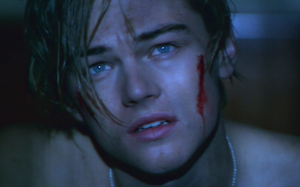
“Ha, banishment? Be merciful, say death.” (3.3.12)
The connection between love and violence in Romeo & Juliet is most evident in the actions and thoughts of the lovers themselves. Both Romeo and Juliet threaten to kill themselves at the first obstacle to their love, each one imagines the other looking dead the morning after their wedding night, and their intensely passionate “star-crossed love” culminates in their double suicide. While their goal is always to keep their love pure, the fact that they both resort to violence to achieve that end supports the story’s major theme of passion as a powerful and blinding force that few can resist.
By all accounts, passion seems to be the cause of all the conflict and grief in Romeo & Juliet. Then again, without passion, there would be no story in the first place, would there?
4) Light and Darkness
More light and light, more dark and dark our woes. – Romeo Montague (3.5.36)
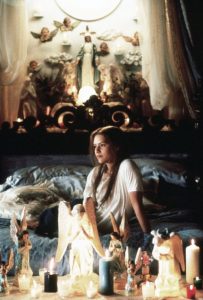
“Gallop apace, you fiery-footed steeds” (3.2.1)
A particularly prominent motif in Romeo & Juliet is the imagery of light and darkness. This motif manifests most frequently in night and day, as much of the action in the play happens either at night or in the morning. And while it doesn’t necessarily highlight any moral statement, the light and dark imagery of Romeo & Juliet does provide an interesting contrast throughout the story.
The most famous example of this imagery is during the balcony scene when Romeo describes Juliet as the sun, being so beautiful and radiant that she has the power to turn night into day. Another well-known example of this contrast is the morning after their wedding night, when the lovers playfully argue about the time of day before Romeo leaves for Mantua. These scenes highlight differing perspectives of the world and emphasize how Romeo and Juliet seek refuge in their love to oppose the reality that threatens to separate them.

“Wilt thou be gone? It is not yet near day.” (3.5.1)
Unlike many other stories that use this motif to symbolize good and evil, the light and darkness in Romeo & Juliet are far more neutral. The lovers favor darkness because it gives them the privacy they desire, yet they see only light in each other. And although it never plays a direct role in their story, the contrast of light and dark does permeate the play until it culminates in a final poetic union: the darkness of Romeo and Juliet’s deaths and the light of hope in their families’ reconciliation.
5) Individuality vs. Social Conformity
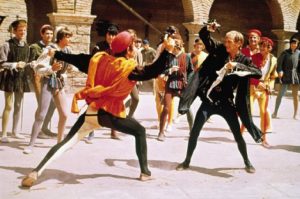
“Alla stoccata carries it away.” (3.1.77)
While love and fate pull most of the strings in Romeo & Juliet, the lives of the main characters are further complicated by the obstacles imposed by their society. Throughout the story, Romeo and Juliet struggle (with varying degrees of success) to defy the social institutions that oppose their love, such as:
- Family and patriarchy
- Religion
- Law and social order
- Masculine honor
Yet despite the challenges they face, the young lovers repeatedly prove that their love is stronger than the social norms that threaten to keep them apart. Juliet defies her father’s authority in order to marry the man she loves and remain loyal to him to the end. Romeo compares Juliet to the sun and considers her more beautiful than the goddess of the moon, while Juliet refers to Romeo as the “god of my idolatry” (2.2.114). While still banished, Romeo returns to Verona to see Juliet one last time before he dies. Romeo refuses Tybalt’s challenge for Juliet’s sake (though he later succumbs to the pressure of honor after Mercutio is killed).
By constantly rebelling against their world, Romeo and Juliet establish themselves as individuals who seek to distance themselves from the obligations their public social lives impose upon them. Yet despite their best efforts to rebel through individuality, these social institutions continue to force them further into a corner until they’re left with only one option for escape. If anything, the greatest tragedy of Romeo & Juliet is that as powerful and beautiful as their love is, they can only find peace from their poisonous society through the ultimate form of darkness and privacy: an eternity together in death.
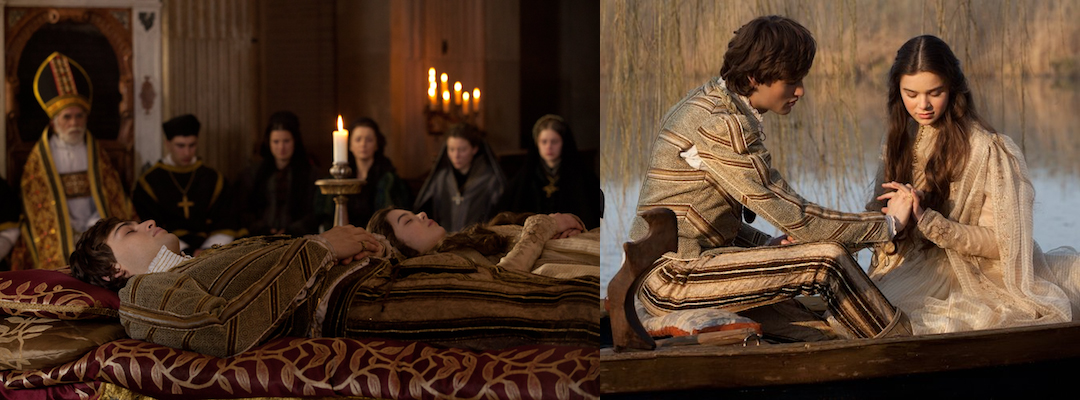
“For never was a story of more woe, / Than this of Juliet and her Romeo.” (5.3.309–10)
What are your thoughts on these themes and motifs in Romeo & Juliet? Any other interesting themes you would add to this list?
by Naomi L. | September 29, 2017 | J.C. Wolfe's Writing, Poetry |
She’s always been there from the start
And loved me every day.
Whenever I was feeling lost,
She helped me find my way.
She gave me almost every book
That I read as a kid,
And nothing made me dream as big
As reading always did.
I started writing short stories
Around the age of nine,
Thanks to the books she shared with me
That sparked this love of mine.
I wouldn’t be a writer now
Had she not held my hand
And guided me from childhood on
Through books’ enchanted land.
And every single piece I write,
She always seems to love.
Her feedback never finds a flaw,
All “five stars” and above.
My whole life, I have felt so blessed
She played the biggest part
In pushing me to reach my dream
Of making works of art.
No matter where I go from here,
I know she’ll always be
The person I can count on most
To always cheer for me.
So have a Happy Birthday, Mom,
In every way you can!
I love you to the moon and back,
My all-time biggest fan!
Happy Birthday to my amazing mother! Thank you for always supporting my dream to be a writer! I love you!
by Naomi L. | September 27, 2017 | Blog, Creative Writing |
Writers need a lot of support to make it through their careers. For many of us just starting out, the bulk of that support comes from family, and of all the relatives who motivate you, few do it better than your mom. Given that she’ll always love you no matter what, you know she’s been there for you since the beginning of your life, and she’ll always be there for you to the end!
This week marks a special occasion for that amazing woman in my life, so today I want to honor her with a creative writing post highlighting all the awesome ways she’s supported my dream to be a writer. For your consideration, here are ten signs your mom is the biggest supporter of your writing career. Thanks for all your support, Mom!
 1) She gave you the book that made you want to become a writer in the first place – In my case, that was Charlie and the Chocolate Factory, a book my mom had read as a child and recommended to me when I was nine years old. It changed my life!
1) She gave you the book that made you want to become a writer in the first place – In my case, that was Charlie and the Chocolate Factory, a book my mom had read as a child and recommended to me when I was nine years old. It changed my life!
2) She’s bought you dozens of books throughout your life – From a Roald Dahl collection to the Harry Potter series to The Mists of Avalon, much of my writing has been inspired by books my mom gave me when I was growing up. If your mom gave you plenty of books when you were a kid, you’ll likely find traces of those in your writing too!
3) She didn’t laugh when you told her you wanted to grow up to be an author – If anything, she encouraged your dream and promised to read every single one of your books (which of course you promised to give her free copies of). Bonus points if she bought you the books and/or courses on writing that helped you get there.
4) She brags to everyone she knows that her daughter/son is a writer – Maybe this embarrasses you a little, since most writers prefer to keep to themselves, but hey, free marketing is always a plus!
5) She’s always the first to read your stories – And she loves every single one. Seriously, you could probably write the goriest thriller ever and your mom would still tell you she enjoyed it (though it might be safe to assume she at least skipped over some parts).
6) She’s always the first to review your books – And it’s always five stars across the board. You couldn’t ask for a more devoted fan!
7) She thinks everything you write is amazing – Your mom can never find a single flaw even in the first drafts of your work. This makes her a terrible beta reader but an excellent motivator!
8) She insists that you’re a better writer than most famous authors – And even though you know it’s not true, you appreciate that she’ll always be your biggest fan.
9) She encourages you to keep writing even when you want to give up – She didn’t invest all that time and energy supporting you just to watch you quit on your dreams. Now get back to writing that future bestseller!
10) No matter how successful you really are, you’ll always be a bestselling author in her eyes! – And could you really ask for greater support than that?
Is your mother your biggest fan? How many of these signs fit her? What other signs would you add to this list?
Today’s post is dedicated to my mother, whose love and support have always kept me going on my writing journey. Happy Birthday, Mom! I love you!
by Naomi L. | August 25, 2017 | J.C. Wolfe's Writing, Poetry |
I love you and everything about you.
I love how compatible we are and how well we get along.
I love how much brighter my life has been since you came into it.
I love the way you look at me with those adoring brown eyes.
I love the way you smile at me every time you see me.
I love the way you tell me that I’m beautiful, that I’m smart, that I’m wonderful, and that you can’t imagine your life without me.
I love that I can’t imagine my life without you either.
I love that you’re an artist and that you know what being an artist entails.
I love that you’re an introvert too, so you also understand the challenges of dealing with people.
I love that you support my writing as much as I support your music.
I love that you respect my passion enough to always give me the time and space I need to finish a piece.
I love that you can handle being in a relationship with a crazy writer.
I love your sense of humor.
I love the way you tease me and how you can always make me laugh.
I love how we share so many ridiculous jokes that only we understand.
I love how I can always count on you to hug me when I cry and make me feel better when I’m sad.
I love that no matter what happens, I always have you.
I love believing that as long as we have each other, anything is possible.
I love how we can talk about anything, or even just sit together in silence and enjoy each other’s company.
I love just being in the same room with you.
I love waking up next to you every day and falling asleep next to you every night.
I love that we don’t have to say good night through a computer screen anymore.
I love that we can finally look into each other’s eyes and kiss each other for real.
I love that you waited for me.
I love that no matter how hard it was or how anxious we both were, you never stopped believing that someday we’d be together again.
I love that you were right.
I love that I can write totally cheesy romantic poems about you and still mean every single word.
I love that you still inspire me to write romantic poetry, even after knowing you for years.
I love how there are so many things I love about you that the word Love doesn’t even sound like a word anymore.
I love loving you.
I love that you love me.
And I love how after all these years of waiting, we can finally be together for good.
I love you, my love. And I always will.
Happy Birthday to my wonderful boyfriend! You will always be the light of my life! I love you, sweetheart!











 1) She gave you the book that made you want to become a writer in the first place – In my case, that was
1) She gave you the book that made you want to become a writer in the first place – In my case, that was 
Recent Comments